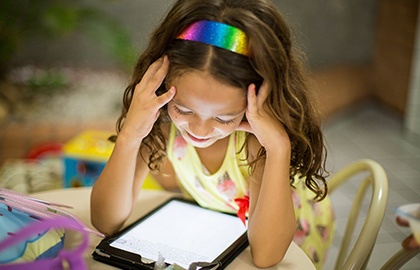Balancing Screen Time for Your Family

Whether it’s a phone, laptop, tablet, or TV, we’ve grown accustomed to using devices for extended periods of time. The average adult spends four hours, and the average child spends seven hours, of recreational time in front of a screen. While it’s totally fine to enjoy movies, games, and social media, it’s important to balance your family’s exposure to digital content. Here are some tips and tricks for keeping your screen time at a healthy limit.
Give your mind time to warm-up
Many people have a habit of checking phones first thing in the morning. Beginning your day with emails, notifications, and reminders can trigger stress – it’s like running a marathon without warming up first! The same can happen to children’s brains. Other morning activities, such as eating breakfast or getting dressed, may set your family up for a calmer day. Be sure to talk with your pediatrician about how to introduce screens in a healthy, effective way. Some pediatricians recommend only 1 hour of screen time daily for children aged 2 – 5 and 2 hours for children aged 6 – 8, so be intentional about when you introduce a device to their day. It’s typically recommended that children under the age of 2 have no screen time at all.
Blend learning with playing
It’s important to make sure that the media your child watches is age-appropriate, learning-oriented, and fun. Educational shows and games that talk directly to the viewer are most ideal for young children. For example, an app that teaches your child their letters is a great compliment to flashcards or worksheets you might do at home.
Alternate with meaningful activities
Screen time can be a helpful distraction for your children, especially if you have tasks to finish. Be sure to encourage a variety of self-play activities in addition to screen time, so that your child learns to occupy themselves. Consider alternating a puzzle with a movie, or a coloring book with a video game, to break up the amount of screen time in a day.
Shut it down before bedtime
Besides the occasional movie night, it’s a good idea to wrap up screen time well before bed. You might have heard about the blue light that emits from our devices; it mimics daylight and can trick our brains into waking up when it’s time to wind down. Easing into bedtime without a screen can make it easier to put your child to bed. Routine bedtime activities, like a bath and reading, help prepare you and your family for a restful night ahead.
